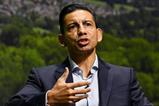Some of those who were baying for the blood of Defra secretary Thérèse Coffey might be thinking today of the old adage, ‘be careful what you wish for’.
News that Liz Truss’ cigar-chomping former deputy was on the way out may be welcome news for many, but the jury is out on whether Steve Barclay’s track record at the Department of Health merits the Reservoir Dogs-style video of his arrival posted on social media by Defra… surely the smoothest running of its IT operations in many years.
Barclay’s appointment was revealed soon after Coffey proved that just because you walk in through the front door of number 10, it doesn’t necessarily mean you emerge with your ministerial job intact. Barclay’s strut into his new office doesn’t, however, hide the fact he was being moved sideways (or demoted, as most observers saw it) as part of yesterday’s remarkable reshuffle by Rishi Sunak.
Ridiculously, Barclay becomes the sixth Defra boss in five years and, as if that wasn’t problem enough, he brings with him a track record described by Defra’s former lead non-executive as an “embarrassment”.
Henry Dimbleby, the man who made that attack in The Grocer after walking out as the government’s obesity tsar, was scathing of Barclay’s spells as health secretary. He is a man who, during his two terms in the role, oversaw a series of screeching rowbacks on public health policy, scrapping plans for a ban on junk food ads and kicking proposals for a clampdown on multibuy promotions into the long grass, along with, says Dimbleby, any meaningful intention to tackle the obesity crisis.
“The government has given up on any of their big promises. They have given up on public health. It’s completely shocking and depressing,” was Dimbleby’s verdict.
David Cameron, the man whose referendum led to Brexit
Now, after replacing Coffey for a second time in just over a year, all eyes will be on whether Barclay’s arrival will see a similar fate for key environmental policies, which have already become bogged down in the mire under Coffey’s controversial stewardship.
With flagship plans including extended producer responsibility and the deposit return scheme already having been postponed until 2025, at the earliest, Defra was then effectively humiliated when Sunak “scrapped” controversial proposals for a shake-up of local authority collections as part of his attempt to reinvent his premiership.
Admittedly, Sunak’s attempt at a reset involved the jettisoning of a so-called seven bins strategy which, as it turned out, never actually existed in the first place, along with other canned ‘policies’ such as the meat tax. But the move was viewed as more than just a reinvention of the PM. It was also seen at the time as a significant signal of the influence from within the Tory party of hawks who regard the road to net zero, and policies on the environment and green energy, as a burden on businesses and consumers, and as an agenda for Guardian readers rather than a Tory government that had stomped down the red wall. An agenda which they could win votes by rolling back.
That certainly seemed to be the road Sunak was heading down, and with many expecting an announcement that DRS will be further delayed, if not scrapped, former Brexit secretary Barclay has the right credentials as the man to carry the hatchet.
But of course, the reshuffle has been most talked about because of the departure of Suella Braverman, that most vocal of the anti-woke brigade, and the return of former PM David Cameron – the man whose referendum led to Brexit and the ensuing mess.
Anyone wondering what on earth Cameron’s return has to do with Defra and food and drink policy, even if he was the politician who first began considering a deposit return scheme in 2010, should consider the wider signal his appointment sends out.
How will the new Defra secretary tackle DRS?
Sunak, who began his No 10 life trying to be the man who would bring grown-up thinking back into government, appears to have gone back to that mantra in this reshuffle.
And that is exactly the sort of approach Defra needs.
The industry is crying out for mature leadership on huge issues such as carbon emissions, food waste and the war on plastic, all of which are battles in serious danger of being lost. It needs adults in the room.
“What private business, the British public and our natural world urgently needs is consistency in leadership and to take ambitious steps to tackling some of the big environmental issues of the day, like the plastic crisis,” says City to Sea campaign manager Steve Hynd, in a verdict which neatly sums up the situation.
“Instead, we have flagship environmental policies like DRS being watered down and kicked down the road beyond the next election.
“We strongly urge Steve Barclay to get a grip of the situation, and to set ambitious and legally binding targets around key areas such as plastic reduction and reusable packaging that we all, business, citizens and the natural world alike, have confidence in.”
The FDF, on the other hand, said it was “delighted “ to be able to continue to work with Barclay, who after a year of dealing with NHS strikes could almost be forgiven for thinking he will face an easier time of things at Defra.
But the long list of challenges it faces might just make that a case of wishful thinking. And the warm reception he received won’t last long unless he can prove, like the old Brexit mantra he knows so well, he is a man who can get things done.

























No comments yet